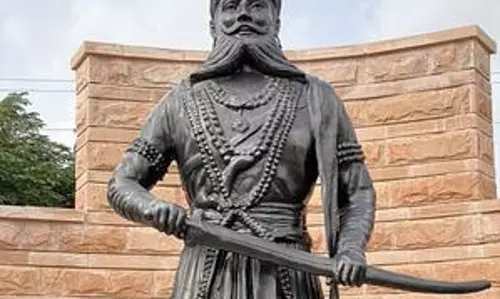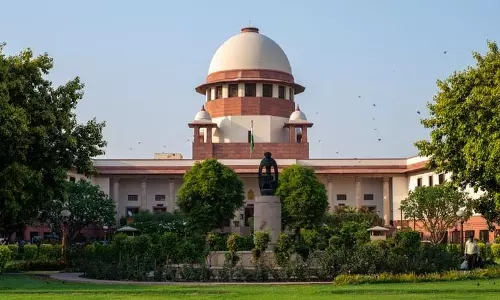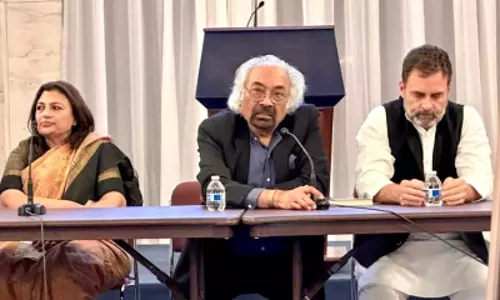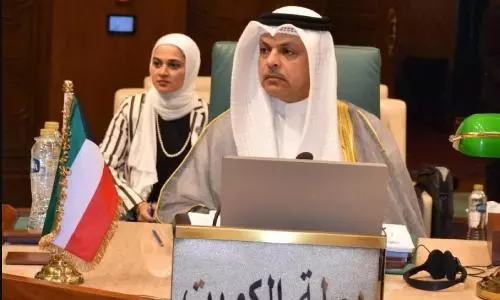
Should India accept foreign aid for Kerala floods?
text_fieldsAmid the ongoing human catastrophe of the Kerala floods, the peculiar debate going on in our country about whether we should accept foreign aid strikes a particularly jarring note.
When the initial period of flooding started in Kerala in mid- July, the State Government requested the Centre to provide at least Rs 831.10 crores for flood relief, but the Centre only sanctioned Rs 80 crores. On 30th July, 2018, in the LokSabha, I urged the Centre to provide additional funds; however this was not acceded to.
When the flood situation worsened by mid-August, the State Government requested Rs1,220 crores from the National Disaster Response Fund for immediate relief assistance. On 13th August, the Centre allotted only Rs 100 crores for this purpose, even though the State Finance Minister publicly stated that Kerala needed Rs 3,000 crores for immediate relief work.
On 18th August, the Prime Minister visited Kerala and announced an additional assistance of Rs 500 crores, less than half of what the State Government requested as immediate assistance (not even counting foreseeable long-term reconstruction needs).
UAE offered assistance to the tune of Rs700 crores, and Mr.Modi on twitter thanked Sheikh Mohammed bin Rashid Al Maktoum of UAE, but his Government let it be known to the media that the UAE grant would be rejected (though the Central Government has not issued a formal statement). Ruling party spokesmen have explained that the Modi Government’s stance comes from an earlier policy decision of the UPA government not to accept foreign aid for tsunami relief.
Section 11 of the Disaster Management Act, 2005 has mandated the formulation of a Nation Plan as a policy framework to govern disaster management in India. Paragraph 9.2 of the National Disaster Management Plan, 2016 clearly states “As a matter of policy, the Government of India does not issue any appeal for foreign assistance in the wake of a disaster. However, if the national government of another country voluntarily offers assistance as a goodwill gesture in solidarity with the disaster victims, the Central Government may accept the offer.”
Since the offer from UAE was not based on a request from the Government of India, it is an unsolicited goodwill gesture, and therefore it is entirely permissible for the Centre to accept the amount as per its own policy.
The Ministry of Foreign Affairs of Qatar on 19th August, offered to provide $ 5 million for the people of Kerala. Maldvies offered to provide Rs 35 lakhs as assistance. These offers are likely to meet the same fate. In fact Indian Missions abroad have been instructed to turn down offers of assistance.
Thailand was also interested in providing assistance. However the Ambassador of Thailand tweeted on 22nd August, saying “Informally informed with regret that the Government of India is not accepting overseas donations for Kerala flood relief. Our hearts are with you, the people of Bharat."
However, this reasoning is not justified. In the earlier cases, the Central Government was able to meet the needs of suffering victims from its own resources. The cash-strapped Modi government has not even met the current and pending requests of the State for flood relief, and is unlikely to come anywhere close to the sums required to rebuild the state’s damaged infrastructure – reportedly likely to be upwards of 20,000 crore.
In any case, the existing policy framework is the 2016 policy and not the precedents of 2004 and 2013. Under the Modi government’s own policy, there is no reason why the aid offered voluntarily by friendly foreign governments cannot be accepted. Even the United States accepted the foreign aid that came in after Hurricane Katrina struck in August 2005.
If the Government in New Delhi feels it has adequate funds to meet the assessed needs of Kerala – which include 10 lakh displaced people, 39 damaged bridges, 80,000 km of ruined roads,and more than 50,000 homes either damaged or swept away - then it owes an explanation to the people of Kerala as to why these funds are not being allocated in sufficient amounts.
The Government of India accepted international assistance when the Bhuj Earthquake of 2001 took place in Gujarat. The total funds requested by UN bodies such as the UNDP, WHO, UNICEF, ILO among others to provide assistance at that time was US$42,670,702. The United Nations Office for the Coordination of Humanitarian Affairs provided US$ 150,000 a day after the earthquake.
I am not objecting to the succour the international system provided the good people of Bhuj. India is a member in good standing of these UN agencies, and there is no shame whatsoever in accepting their aid. The basic principle of international co-operation in the face of huge disasters is “one for all and all for one”. India has voluntarily provided help when our neighbours have been similarly afflicted – after the earthquakes in Nepal, Pakistan and Iran, and floods in Bangladesh and Myanmar, India was quick to provide aid. Why shouldn’t others similarly extend a helping hand to us when we are in distress?
It is important to keep in mind that Kerala requires a special financial package for long-term reconstruction and rehabilitation, as the funds from the NDRF are used only for immediate relief assistance. When Cyclone Ockhi struck, the State Government requested Rs. 7304 crores for rehabilitation and reconstruction, which the Central Government refused. The Centre only provided Rs 133 crores to Kerala for immediate relief assistance. (When I questioned the Government on this point in the Lok Sabha on 24th July, the MoS for Home Affairs failed to give any reason for the rejection of Kerala’s request for a special financial package.) Kerala was still smarting from this insult when the flood crisis struck.
Yes, India is a proud and self-respecting nation that prefers to rely on its own resources. Our government likes to think of itself as an aid-giver, not a recipient. Whenever our resources are adequate to meet the needs, we should remain self-reliant. But when the requirements of a disaster-struck state vastly exceed anything that the Central Government can provide, it is both churlish and irresponsible to reject aid from those who can provide it. No policy can justify callousness towards our own suffering citizens.
By all means, do not go abroad with a begging-bowl. But when your friendly neighbour knocks on your door and offers you a cup of sugar you don’t have, you don’t turn him away. It is time for us to revisit our entire approach to foreign aid in the face of massive natural disasters.

















